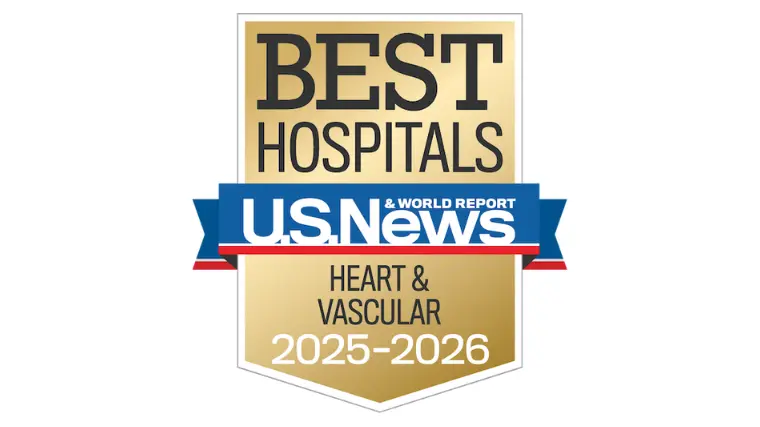Heart Disease Prevention

Preventing Heart Disease
Nearly half of the U.S. population has some form of heart disease, and the University of Chicago Medicine Preventive Cardiology Program is committed to helping people understand their risks of developing heart disease. Our goal is to make sure our patients know what could lead to heart disease before they are diagnosed or early into their condition so that we can keep you healthier longer.How to prevent heart disease?
Preventive cardiology is a dedicated section of cardiology that specializes in assessing patients’ risk for heart disease and developing a plan that will prevent or slow the progression of heart disease for long-term success. Preventive cardiology is typically separated into two types of care:
- Primary prevention, which works to reduce the risks of developing heart disease by creating a treatment plan that will prevent that first heart attack or stroke based on an individual’s risk factors.
- Secondary prevention, which is used to slow the progression of existing heart disease by taking preventive action early to avoid any additional cardiovascular events, such as a second heart attack and stroke.
If you (or family members) are concerned about being at risk for cardiovascular disease, UChicago Medicine's preventive cardiology team can evaluate your heart and provide you with tools and therapies that will aid in the prevention of heart disease.
When should I see a preventive cardiologist?
There are several risk factors, including hereditary factors, that can increase your likelihood of having heart disease in your lifetime. If one or more of the following risk factors apply to you, or your family members, you should see a preventive cardiologist to assess your heart health and identify what can be done to address any existing or possible cardiovascular conditions sooner.
Early Risk Factors or Signs for Heart Disease
- Previous heart and/or vascular diagnosis/event, such as heart attack, stroke or peripheral artery disease, increases your chances of developing a subsequent cardiovascular event.
- Personal history of cardiovascular disease, especially in women below age 65 or men below age 55
- Family history of heart disease has been shown that there are higher incidences of heart disease if one or more family members have been previously diagnosed
- High levels of lipoprotein (a) can increase the chances of atherosclerosis, a buildup of plaque in arteries that lead to coronary heart disease, stroke, vascular disease and more
- Difficulty controlling risk factors for atherosclerosis, particularly if you have any cholesterol disorders or high blood pressure
- Inflammatory disorders like systemic lupus erythematosus, rheumatoid arthritis, inflammatory bowel disease, psoriasis, Sjogren’s disease, systemic sclerosis and HIV put patients at higher risk for heart disease
- Female-specific risk enhancers, such as high blood pressure during pregnancy/preeclampsia, gestational diabetes, pre-term birth and premature menopause (before age 40)/menopause/perimenopause increase the changes of cardiovascular issues over time.
- Existing health issues or comorbidities can damage the heart over time, such as uncontrolled, untreated or unmitigated:
- High blood pressure
- High blood sugar, prediabetes or diabetes
- Obesity, especially with excess abdominal fat
- Smoking
- Unhealthy diet
- Lack of exercise/sedentary lifestyle
- Incidental finding of coronary artery calcification noted on chest CT or other imaging studies identifies plaque in the arteries which can lead to heart disease, heart attacks, stroke and other heart diseases
Our preventive cardiology experts can determine your unique risks, medical history and any comorbidities that can lead to heart attacks, strokes and heart disease, and will address these conditions early, putting UChicago Medicine at the forefront of treating or preventing heart disease.
Hi. I'm Dr. Kathleen Drinan. I'm a clinical cardiologist with UChicago Medicine. I'm here today to talk to you about Eight Simple Steps for a Heart-Healthy Lifestyle.
Remember to include physical activity in your day. Try to make it a habit. Ideally, 30 minutes a day, five days a week. Keep it on your schedule. And incorporate it into your day.
Introduce a heart-healthy diet. It's never too late to change your diet. Making healthy food choices like fruits, vegetables, whole grains, lean meats, and low-fat dairy products can be very important. Know your cholesterol. Remember that high cholesterol can contribute to plaque, which can clog arteries and lead to heart disease and stroke. When you control your cholesterol, you're giving your arteries their best chance to remain clear of blockages.
Monitor blood pressure. Know your numbers and check your blood pressure regularly, whether from your doctor in the doctor's office or your cuff at home or your local pharmacy. Remember, high blood pressure or hypertension can lead to the development of heart disease, kidney disease, stroke, and many other problems.
Maintain a healthy weight. Know that excess fat increases your risk of developing many risk factors for heart disease, including diabetes. So obviously, staying at that optimal weight is what we'd all like to see our patients continue to do.
And then strive to quit smoking. It's never too late to quit smoking. Many patients it takes a few tries, but smoking itself and the smoke can contribute to the damage to blood vessels, can cause emphysema, can increase your risk for cardiovascular disease, as well as your risk for different cancers.
Know your blood sugar. Routinely checking your blood sugar can help you monitor your heart disease risk. And get a better night's sleep. We all want a better night's sleep. Sleep disorders themselves can increase our risk for the development of cardiovascular disease. Sometimes through elevated blood pressure, some patients can have cardiac arrhythmias related to sleep abnormalities. Getting a good night's sleep and monitoring with good sleep hygiene is very important.
These are the eight ways to help you lead a healthier, happier lifestyle.
[MUSIC PLAYING]
Our Preventive Cardiology Services
Nationally Ranked in Cardiology, Heart Surgery and Vascular Surgery

Find a Preventive Cardiology Location Near You
Request an Appointment
We are currently experiencing a high volume of inquiries, leading to delayed response times. For faster assistance, please call 1-773-702-9461 to schedule your appointment.
If you have symptoms of an urgent nature, please call your doctor or go to the emergency room immediately.
* Indicates required field
